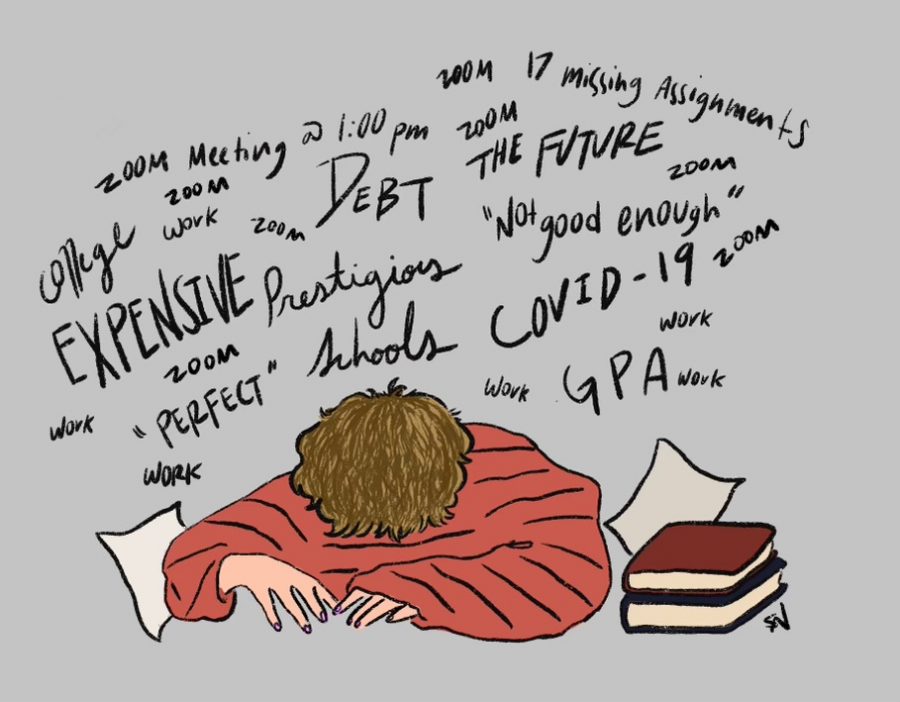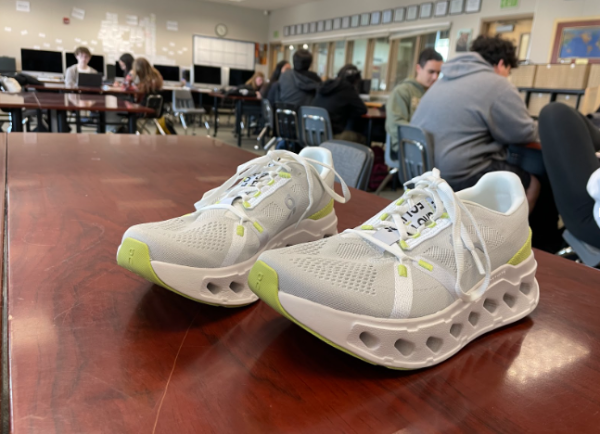Walking the academic tight rope: Why students shouldn’t conform to a linear idea of success
For most, knowing exactly what to do after high school is almost impossible, and the pressure to achieve what others deem as successful makes matters worse.
Photo by Sophia Novelo
Students are constantly worrying about the next steps after high school even in circumstances in which the future doesn’t seem so bright.
Stressed. Overwhelmed. Confused. Anxious. These are just a few of the many feelings that high school students face when they think about their future. Anxiously anticipating or even fearing life after graduation can be draining. Sure, we would all like to be successful, and we understand the severity of completing high school on a high note. However, a lot of the choices we make now won’t define us in the long run.
From grades to the expenses for higher education, students often find themselves stuck or insecure thinking they’re behind the rest of their peers. It’s common for students to feel like they need to keep up with the standards set by family or society, whether that be going to a certain college, graduating with an exceptional GPA, or choosing a high paying career even if it may not follow their passion. But according to inc.com, a study conducted by scientists out of Cornell and the New School for Social Research showed that people were more likely to regret not “fulfilling their ideal self.”
“It’s overwhelming that high school is already practically over; for so many, college is the end goal, but at the same time, many seniors don’t even know what they want to pursue,” senior Frhaicez Del Carmen said.
Anxiety for what comes next is especially potent for seniors who are constantly reminded that graduation is around the corner. The pressure to apply to a certain number of schools and be accepted into the prestigious ones leaves a lot of students feeling afraid due to them associating rejection with failure. Intense worry is a top contributor to senioritis. The pressure to have things figured out while also trying to get through high school causes many seniors to give up near the end.
“I think that it’s a lot harder to stay motivated in school as a senior, especially now during the pandemic. It’s harder to stay on top of things and keep up with work. A good option that works for me with managing stress is to take time for yourself but set a schedule, so that you plan ahead of time and are able to complete your work. I usually set an alarm on my phone on the weekends and when it rings, I start to work on my homework and it is much easier that way, because I already set time in my day to do it,” senior Priscilla Cruz said.
Keeping up with grades and perceiving them as a measurement of one’s self-worth can leave students feeling subpar if they see anything other than an A. This mindset can damage their self-esteem and increase their stress. Aside from feeling the need to prove their competence, students don’t often know where to start when it comes to applying to the schools. They fear that it might be a waste of time if they get rejected, or that they won’t even be able to afford the cost of attending.
Recent data from educationdata.org shows that the average college graduate spends roughly 20 years repaying their student loans, and that the average amount of debt is $32,731 per loan. The reputation that universities have for being very costly has caused certain students to become increasingly overwhelmed with financial issues. At such a young age, students are aware that they could be making one of the biggest investments of their lives. Naturally, this comes with a huge stress factor and an incentive for these students to make a decision on what career path they’ll choose.
“Senior year was not at all that I was expecting, however, the pressure to keep my GPA up and dealing with my classes was a constant in my life. I really don’t care that my senior year was stolen or that we didn’t get a normal year. To me, there are more important things and I’d rather focus on myself. I’m still 17 and just trying to figure out what I want to do with my life. Sometimes I forget that I’m not supposed to have everything figured out and it’s a nice reassurance that I still have time to figure everything out,” senior Alexa Guzman said.
Some students don’t have the desire to go to college but feel pressured by their peers to do so. College is believed to be a necessity, as it can increase a student’s likelihood of becoming successful. A common reason why students drop out, however, is because they end up regretting their choice of study. It is very beneficial for students to discover the passions that bring them joy without the pressure of feeling they have to commit to a major right away.
“Messing up also makes us feel like we failed everyone. This makes us feel even more stressed and worried than what it should actually be,” senior Luis Romero said.
Fortunately, there are methods to ease the stress. Keeping up with school is important, but so is engaging in self-care and finding peace of mind. Emailing teachers, setting up meetings, and studying with friends can also manage academic pressure. As for anxieties caused by finances and college applications, there are several resources that you can use to simplify the process of selecting your schools. Fafsa can let you know if you qualify for financial aid, scholarships, and grants like the Cal Grant. The College and Career Center can guide you to more resources as well. Every path is valid. Students deserve to be happy with whatever they choose, and determining what life will look like after high school should be a process of their own, not anyone else’s.

(She/Her) Sophia Novelo is a senior and this is her second year in journalism. As an Editor-in-Chief, Sophia fosters an environment in which students'...






